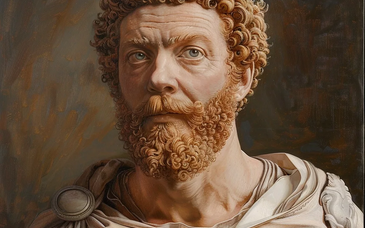The Roman republic was led by two Consuls who were joint heads of the Roman state and commanders-in-chief of the army. They were elected only for one year and thereafter could not be re-elected again for 10 years, in order to prevent any form of tyranny. Until 367 BC plebeians were barred from the office of consul. The first plebeian consul followed immediately after the change in 366 BC.
The main role of consuls was to prepare and propose new laws. Though this required co-operation between the two consuls, as either had the power to veto any proposals by the other.
In times of crisis, a Dictator could be appointed. His time in office could not be longer than six months. But for his time in office he possessed the absolute power of a king.
Until 367 BC plebeians were barred from the office of consul. The first plebeian consul was appointed in 356 BC Gaius Marcius Rutilus).
Religion was firmly in the hands of the Pontifex Maximus (High Priest) - a title still held by the present day pope. The pontifex maximus was, as were pretty much all official positions, an elected office. But unlike other offices its holder enjoyed a residence at the Roman forum in the very heart of Rome. His chief duty was to preside at a state ceremonies, but apart from that he also oversaw the calendar and chose the vestal virgins, as well as some of the priesthoods. He also possessed powers to discipline members of the priesthood.
The Censor (of which there were two) was in his main duty the registrar of Rome. But he also oversaw the finances, including taxation, inspected the quality of public works and - more controversially - oversaw public morality.
In his role as registrar of Rome, he and his staff compiled lists of all Roman citizens, recording their name, age, ancestry, families, wealth as well as which one of the three tribes of Rome they belonged to.
If the initial purpose of the census, the counting of the people, was to allow for the military strength of Rome to be assessed, then it was naturally the censor, during the time of conscription, were in charge of assigning men, according to their status, to the various types of infantry or cavalry.
In their role of inspectors of public works, they oversaw the maintenance of the temples, roads, water systems.
Their powers of moral guardians were sweeping ones. Not only were they charged to discourage unmarried couples living together and to punish anyone who did not properly maintain his land, but they even possessed the power to bar a senator from the senate.
Simply for not seeing to his lands properly a citizen could be reduced to the lowest rank of citizenship.Equestrians too would be punished,if they were found to have neglected their horse, provided to them by public funds.
The office first arose in 444 BC, the first plebeian to hold it was Gaius Marcius Rutilus in 351 BC. Generally this powerful office was only ever granted to those who had already ascended the 'ladder of honour' from quaestor to consul and had thereby proved their worth. From the second century BC onwards, elections for this office were held every five years, coinciding with the census of the people. Despite the five yearly elections, a censor would only hold office for eighteen months, meaning that for the remaining three and a half years there would be no censors in place. Although his rulings would stay in place until the next election.
The Praetor (of which there were six after 197 BC) was in charge of the judiciary of Rome. He was in effect the chief law officer. He acted as the chief judge, apart from the consuls who possessed higher authority, should they choose to use it.
He also acted as a deputy to the consuls, in particular regarding the administration of the provinces. And it is therefore that provincial governors were either drawn from former consuls (proconsul) or from former praetors (propraetor).
The office of praetor was created in 366 BC, within about a century the post was held by two. The first plebeian praetor took up office 337 BC.
The Aedile (of which there were four after 421 BC) was the supervisor of public works. He oversaw the public works, temples and markets. (Therefore there must have been some cooperation with the censors who had similar or related duties.) Also he oversaw the organization of festivals and games, which made this a very sought after office for a career minded politician of the late republic, as it was a good means of gaining popularity by staging spectacles.
In 367 BC BC the refusal of the plebeian aediles on one occasion to stage circus games for the length the senate desired, led to the senate simply creating two new patrician aediles, the so-called curule aediles (aediles curules) who then obliged in staging the games for the appropriate length of time. The curule aediles were hence of senior authority. But within twelve months the differences were settled and also plebeians were allowed into the curule aedileship.
The Quaestor (of which there were four after 421 BC, and ten after 267 BC) was in charge of the military and civic treasury of Rome as well as keeping records. (Therefore there must have been some cooperation with the censors who had similar or related duties.)
Further the quaestors also acted as aides to the consuls. This office was the lowest of the magistracies, the beginning of the 'ladder of honour' which would lead to the office of consul.
The minimum age at which one could stand for this office was 25, allowing time for service in the legion. The first ever plebeian to take office as quaestor did so in 409 BC.





